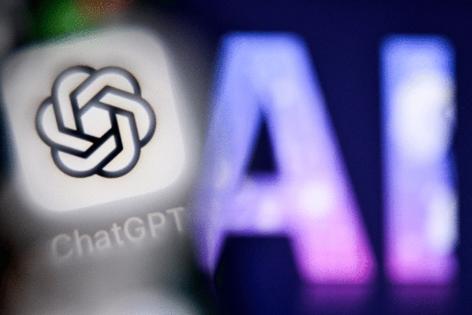Frank Barry: Is ChatGPT the end of good manners?
Published in Op Eds
Have you taken the Bloomberg AI-dentity Quiz? I did, and it pegged me as a “cautious optimist.” That seemed about right — but my sense of optimism was tested recently.
No, I wasn’t reading “If Anyone Builds It, Everyone Dies.” Nor was I trying to determine whether a chatbot would lie, or get something wrong, or reveal its unethical underside. I was just listening to a colleague give me a tutorial on how to use one.
“Don’t be polite,” he said, as he deleted the word “please” while editing a command he was giving ChatGPT. “Saying ‘please’ just wastes its energy and resources. Be direct.”
Uh-oh, I thought. If people learn to stop using polite language when speaking to a human-like helper, won’t they also be less likely to use polite language when speaking to other people?
Courtesy and manners are habits. Once formed, they become second nature. But if using AI also becomes second nature, as the best technology eventually does, will it weaken the small courtesies that are so essential to human relationships?
After ChatGPT delivered a first draft, my AI tutor ended a long follow-up prompt by writing: “DO BETTER. YOU CAN DO A LOT BETTER.”
Wow, I thought — that’s aggressive. Chatbots are often compared to highly capable interns who need specific guidance, but this felt more like we were dog trainers scolding a puppy or football coaches haranguing a linebacker who missed a tackle.
Imagine writing colleagues all-caps texts or emails filled with commands. It may not be an HR violation, but it’s not the path to Manager of the Year, either. Will AI conversations normalize rudeness? I tried to ask about it in the politest way I could.
“Does the Chatbot recognize all caps as expressing heightened emphasis and urgency?”
My tutor was direct.
“Yes — best practice is to yell at it.”
My heart sank. The amount of yelling in public discourse has already reached ghastly levels, and now the most transformative technology of our time is incentivizing it?
A couple of hours later, I met my wife for dinner in Greenwich Village at Arturo’s Coal Oven Pizza, founded in 1957. We sat at the bar and listened to the soft sounds of a jazz trio and the quiet mutterings of a man dining alone. All seemed normal, until I looked up and saw a humanoid robot.
I had not expected to see the future in an historic pizzeria, but there it was — dressed all in gray and moving stiffly but deliberately as it walked out of the restaurant. We had no idea where it came from or what was happening. I should have asked the man with a large camera filming the robot, but he was busy shooting, and I was busy eating a sausage and onion pie.
After watching the robot greet people on the sidewalk, I noticed a text from a friend whose book club produces a literary journal. I had recently helped judge a competition for the publication, where we had been told that one of the stories was written with AI assistance, but not which one. The message confirmed my worst fear: My pick for best story and best writing had been the AI-assisted submission.
Perhaps that’s a reason for optimism — AI can help the creative process — but I found it depressing. So much of history is a celebration of creative genius. What is AI leaving us to celebrate in the arts — robot assistance?
After dinner, we walked two blocks to another venerable Village institution, The Bitter End, a music club that has hosted Bob Dylan, Stevie Wonder, Joni Mitchell and countless other legendary artists. We were there to see our friend Xavier Cardriche play a set. In between songs, he greeted the crowd in a variety of languages — the club draws an international crowd — and then spoke an assortment of words in different languages that left the audience, myself included, wondering what he’d said.
He explained that he’d spoken the most important words to know (“besides beer and bathroom”) when traveling: “please,” “thank you,” and “excuse me.” They go a long way, he said.
Here was the day’s second tutorial on intelligence — only this time it was real, and born of human experience. The respect conveyed in the simple words he spoke is a small but essential part of how we get along with others — and even, as a democratic society, make music together.
The next morning, as I exited a subway car and headed for the staircase, the woman ahead of me stopped short and reversed direction, almost colliding with me.
“Excuse me,” she said, apologetically.
“Sorry,” I replied, automatically.
Maybe as AI improves, we can teach chatbots and robots to insist on being treated with basic courtesies, rather than teaching people to discard them.
I’m cautiously optimistic.
_____
This column reflects the personal views of the author and does not necessarily reflect the opinion of the editorial board or Bloomberg LP and its owners.
Frank Barry is a Bloomberg Opinion columnist and member of the editorial board covering national affairs. He is the author of the new book, "Back Roads and Better Angels: A Journey Into the Heart of American Democracy."
_____
©2025 Bloomberg L.P. Visit bloomberg.com/opinion. Distributed by Tribune Content Agency, LLC.
























































Comments